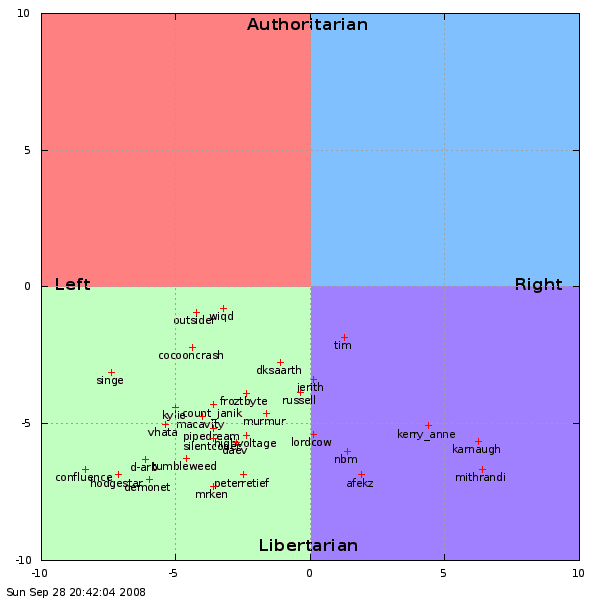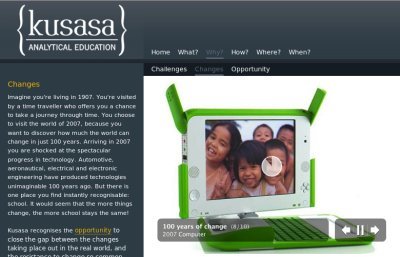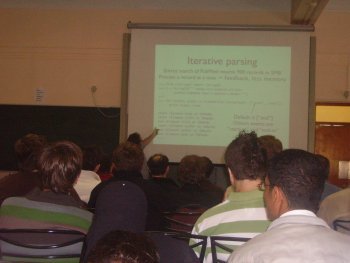Sep 28
The Stereotype
Recently, Jordan Mantha blogged about being excited about Palin joining McCain’s campaign. Some of the comments were quite harsh, some even suggesting that it’s wrong to support the Republicans, being a free software developer and affiated with the Ubuntu project. I will admit that I was quite surprised to see his support for the McCain myself- from the vast majority of posts I’ve seen on Planet Ubuntu, Planet Debian and Planet Gnome so far, most free software supporters seem to support Obama and the Democratic party. Being a supporter of free software (or Ubuntu) shouldn’t imply what kind of political tendencies you have. Statistics might show that most free software supporters might choose something, that doesn’t mean that everyone has to.
The Political Compass
In CLUG, many of the people in our IRC channel participated in the Political Compass test. It asks you a series of questions and then gives you co-ordinates on where you stand politically. Michael Gorven put together a Python script that takes the results from Spinach (our channel bot) and plots it on a graph using Gnuplot:

In the graph above, it’s clear that everyone in our LUG that participated landed in the Libertarian quadrants, and not a single person in the Authoritarian quadrants. Most people are in the Left-wing Libertarian quadrant, with quite a few in the Right-wing Libertarian quadrant. In this case, the graph supports the stereotype that free software supporters may be more inclined to be left-wing libertarians. There are other things that this graph doesn’t bring into account though. Everyone in our IRC channel are also South Africans. Could that perhaps have an effect on our choices and tendencies? We also discuss *everything* on our IRC channel, and we mostly read each other’s blogs. Could it also be that we shape each other’s political views, if only we sway it by the tiniest bit on a continuous basis?
I think it’s natural of humans to make assumptions about other people and the world around them. I think it’s wrong of people to take offence when these assumptions and generalisations do not fit into their little view of the world. While we’re not all unique little snowflakes, we are all different, and tolerance and acceptance goes a long, long way.
See also:
Other Cluggers who have blogged on the political compass:
Oct 07

I just subscribed to Python magazine, who have just released their first issue. The first issue is available at no cost, and future issues will be available at different costs depending on how you’d like to read it.
I wasn’t sure whether it’s the right thing to do to buy a Python magazine, considering that there are so much good free material out there, but the quality of the first issue seems very good, and if it will improve my skills, then I think it’s certainly worth while.
May 10
Previously, I mentioned the Shuttleworth Foundation’s Classroom Coders project. It seems that it may soon be a reality under the Kusasa Analytical Education project. Kusasa is real innovation, it fundamentally changes some of the few 100 years old teaching methods we still use in classrooms.

It makes use of Mathland, Squeak and Python to achieve this. From the Kusasa site:
The idea is not that learners gain tools they use for the rest of their lives. That’s not realistic. We don’t use any specific theorems or other mathematics constructs from school today. Learners should use tools at school which help them develop a general ability to learn new tools. This general ability is the skill of analysis. It is the ability to break a complex problem into pieces, identify familiar patterns in the pieces, solve them using existing tools, and synthesize the results into a view or answer. We want to ensure that learners graduate with this ability, making them effective, successful, productive and fulfilled members of society.
Kusasa is a Zulu word that means “tomorrow”. Take a peak at the Kusasa website for more information. I think it could potentially be a good educational program to run with OLPC/Classmate type PC’s, and even more importantly, have a major influence on the way the future generations learn.
Sep 09
Today I attended the first ever Cape Town Python Users Group Meeting (CTPUG). I didn’t attend the entire event, which is a pity because I missed a talk on Turbogears, which is possibly not all that bad since I decided to go with Django (time-wise I can’t really afford to change my mind  )
)
The day looked very well planned. there were several talks and while a huge amount of it went over my head, it’s good to know that there’s now a very knowledgeable local Python community that I can tap into when I get stuck. There were a surprisingly large amount of people there. 95 people registered for the day, and it seems that it was an accurate account of the amount of people that were there.
Props to Jan Groenewald and Neil Blakey-Milner for setting this up! I hope the CT Python community gets nicely cemented, the same way that CLUG has .












Recent Comments